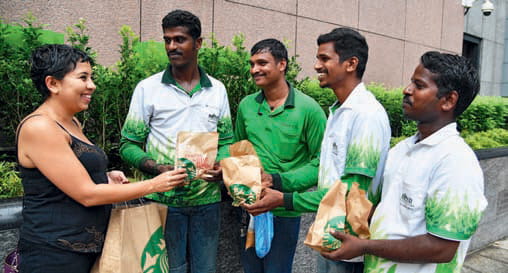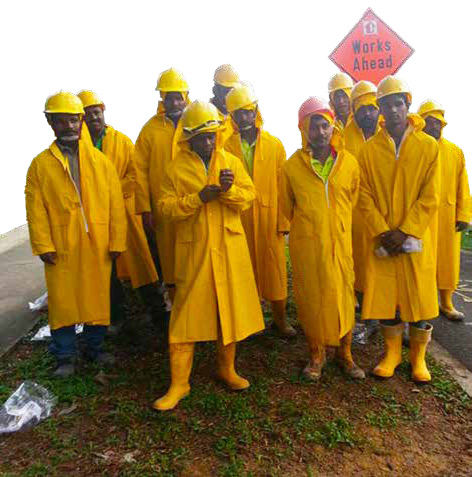Stories > A Rainy-Weather Friend
A Rainy-Weather Friend
Starting with one humane act, lawyer Dipa Swaminathan’s initiative transforms into an inclusive exchange between the migrant worker community and Singaporeans.
BY Shweta Parida
PHOTOS The Straits Times/sph
t all started with a split-second decision that Singaporean Dipa Swaminathan made on a rainy afternoon in 2014.
While driving to run some errands, the Harvard-educated lawyer noticed two workers stranded in the heavy downpour who were wearing black trash bags that barely offered any protection.
At first, she drove past them. But within seconds, she reversed her car to where the workers were, soaked to their bones, and asked them to hop into her car.
“Since I started volunteering, I’ve learnt many aspects about the workers that I wasn’t aware of earlier. Contrary to what some might think, they never rush to grab freebies during our gift and food distribution drives. They only take their share, displaying a high level of integrity.”
Jocelyn Lim, Volunteer, It’s Raining Raincoats
“They were hesitant and refused my offer because they were worried about making my car dirty,” she shares. Taken aback by the generosity of a stranger from a palpably different background than theirs – something they had never experienced – the workers finally got into the car.

Dipa Swaminathan and volunteers redistribute food from Starbucks to the workers throughout the year.
“They didn’t expect it because it was not the first time they had got drenched in the rain,” adds Swaminathan, who works with a local telco firm as an assistant general counsel. She drove them to her house where she, her mother and her helper served the workers hot food and coffee.
When the workers took their leave, she shared her contact details with them and took their photo to post on social media – not to gloat about her generosity but to create awareness about the poor working conditions of the workers. “I wanted to make a point about employers who send their staff out to work without proper gear.”
LIFE-SAVING ACT
However, it was the next turn of events that compelled Swaminathan to proactively engage the migrant worker community. Three months later, she got a call from the police saying a worker had attempted suicide – and all he had was her phone number. She drove to the other side of town to find that it was one of the workers, Murugan, she had helped on that rainy day.
“I was told Murugan would be charged with attempted suicide, which is a crime in Singapore,” she recalls. “After talking to him, I explained to the police that he was really the victim, and that the real culprit was his employer, who hadn’t paid his wages the past six months. He was depressed because he had been unable to send any money to his family, and loan sharks were hounding them to recover the money he had borrowed.”
Taking up his case, she posted his $2,000 bail. Murugan was finally acquitted with no charges. She also followed up with his employer to get all his dues settled. This moment, she reckons, provided the impetus to start a concerted effort. Swaminathan says that following this incident, she became more mindful of cases that concerned the well-being of migrant workers. Soon, she was reaching out to employers about the less-than-ideal working conditions that their workers had to face.
Her work started doing the rounds on social media, leading others – who were privy to cases pertaining to migrant workers’ welfare – to share them with her.
“Most of these workers are not even aware of their rights or the recourse they have access to,” she says. “They keep quiet for fear of losing their jobs. I call up their employers and make them aware that it is important to provide the workers with a more considerate work environment.
“Sometimes it is apparent that the neglect is due to oversight or because they do not have proper systems in place for the workers’ welfare. But, generally, the firms are cooperative enough to address the laxities and rectify them.”

The nonprofit organisation provides raincoats to migrant workers as well as organises community outreach initiatives.
It has not always been smooth sailing, however. She admits to having had the phone hung up on her on the many occasions that she has called up companies to report acts of neglect.
GAINING MOMENTUM
As Swaminathan’s single-person initiative gained ground, so did the accolades and offers for collaboration. After finding out about her work through stories in the news, the Singapore Kindness Movement came calling. It offered to set up a formal organisation and to support the raincoat donation campaign – matching each raincoat donated by the public, with up to 5,000 pieces. This led to the establishment of It’s Raining Raincoats in 2015.
As its name suggests, the non-profit organisation provides migrant workers with not just rain protection gear but also helps build bridges between them and the larger society through outreach initiatives.
It continues to receive support from the Singapore Kindness Movement, which spreads word about its donation drives, and invites Swaminathan’s team to its philanthropy sector networking events.
It’s Raining Raincoats has also received the Kampong Spirit recognition at the 2017 President’s Volunteerism & Philanthropy Awards. These annual awards are organised by the National Volunteer & Philanthropy Centre to recognise individuals, corporates, ground-up movements, non-profit organisations and educational institutions that have displayed excellence in giving to the community.
“The workers tell me that Singaporeans can appear aloof but they are, in fact, caring at heart.”
Dipa Swaminathan Founder, It’s Raining Raincoats
That same year, one of Swaminathan’s former colleagues came across an article on the organisation in a local broadsheet and got in touch. A former accountant, Jocelyn Lim is now a regular volunteer with the nonprofit.
“I’ve always felt that migrant workers were one of the most ostracised groups in society,” she says.
“Since I started volunteering, I’ve learnt many aspects about the workers that I wasn’t aware of earlier. Contrary to what some might think, they never rush to grab freebies during our gift and food distribution drives. They only take their share, displaying a high level of integrity.”
The organisation now has 200 volunteers involved in its various programmes. “Last year alone, we distributed 60,000 presents to migrant workers as part of our Christmas initiative, which were donated by both Singaporeans as well as expats,” she shares. “We do year-round re-distribution of surplus Starbucks food to them, collected by volunteers from 40 outlets throughout the city.”
The organisation also distributes mobile phone data cards during Deepavali to enable them to speak to their families via video calls.
DIGNITY IN CHARITY
If anything, the involvement in the migrant worker scene provides Swaminathan insight not only into the workers’ psyche but also our attitude towards them. “They are like us – why should they be any different?” she questions. “They too have dreams and talents, and they are chivalrous and witty.”
Many workers, who are appreciative of Swaminathan’s altruistic acts, stay in touch to update her about their welfare. In fact, Murugan, whose life she saved, felt so indebted that he continued to visit her and her family every month for the next two years since the unfortunate episode. His wife also called Swaminathan from Chennai to thank her. “He returned to India after two years, but he left a happier man,” she says.
Describing their strength of character, Swaminathan cites an incident. When a volunteer donated a second-hand bike – which had been lying unattended for months in the basement of her apartment – to a group of workers, they were very grateful. “They shared that they had to walk up to 5km from a remote construction site to buy food, but the bike made it so much more convenient, saving them both time and energy,” she says.
However, a few months later, the owner of the bike returned to Singapore after having been overseas for a year and claimed ownership. The volunteer had to ask for it back from the workers, with the promise to replace it with another.
“We felt awful about doing that. I would treat the workers with the same dignity as I would a friend – it’s never nice to ask for a gift back once you have given it.”

Swaminathan and her team of volunteers distribute mobile phone data cards to migrant workers during Deepavali every year.
Yet, the workers were extremely gracious – even scrubbing and oiling the vehicle before returning it – without lamenting that it had been, in fact, a donation.
“Despite their broken English, they are very courteous,” she shares. “The workers tell me that Singaporeans can appear aloof but they are, in fact, caring at heart. There is a strong underlying sense of fairness with which Singaporeans treat everyone.”
Recounting her journey thus far, she says that it may have started with a small favour she did to two workers, but she acknowledges she has gained far more than that in the process. Swaminathan has also noted an improvement in perceptions towards the migrant worker community.
Citing a cricket match between her children’s school team and the workers, she opines that such initiatives focus on creating a more inclusive environment where Singaporeans are increasingly given the opportunity to interact with migrant workers.
What is in store for her and the organisation? “Our journey has been organic. There’s no blueprint for the future, but hopefully, it will only get bigger. When we put out a call for help, we get inundated with messages from people wanting to contribute, which demonstrates that Singaporeans care more than they show.”
